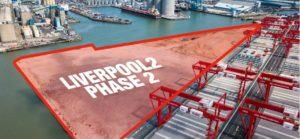 Peel Ports Group, owner of the Port of Liverpool, has commenced the second phase of its expansion programme at Liverpool2, informs the company today.
Peel Ports Group, owner of the Port of Liverpool, has commenced the second phase of its expansion programme at Liverpool2, informs the company today.
Phase 2 involves the investment in equipment and port infrastructure, which will provide Liverpool2 with the capacity to manage the unloading of two 380m vessels simultaneously. Further 3 STS cranes and 10 cantilever RMG cranes will be installed. These will add to the previous 5 STS cranes and 12 CRMG cranes installed as part of Phase 1. There will also be additional reefer points installed to allow the terminal to handle even greater quantities of refrigerated containers at the Port of Liverpool.
As we wrote earlier, a UKP 400 mln project, Liverpool2 was launched in November 2016 and today it is already one of the world’s most modern shipping terminals. This deep-water facility with a capacity of 1 mln TEU acts as an ocean gateway for international trade to and from the UK, being capable of accommodating the world’s largest container vessels and connecting road, rail and canal networks linking directly to the heart of the UK mainland.
Accroding to Mark Whitworth, CEO of Peel Ports, the company is preparing the outline designs and expects to appoint construction partners in spring of next year and to begin the construction shortly after. The completion date for Phase 2 is anticipated in 2019.
Mark Whitworth commented: “The world class facilities which we have at Liverpool2 will allow us to capture and grow a greater share of the container market, offering cargo owners in the north of the country a more competitive route to market, getting their goods closer to their end destination. We are in a good place in our discussions with shipping lines; there are more opportunities on the horizon at the Port and our confidence is high as a result.”
Earlier this year, Peel Ports Group announced that it had secured over 200 signatories for its Cargo200 initiative – a campaign calling on importers and exporters whose goods are destined for the North of England to switch delivery of ocean-freight from south-east ports to the Port of Liverpool. This could imply savings of around UKP 400 mln a year for the companies as well as cutting inland freight mileage by 200 million miles by 2020.
